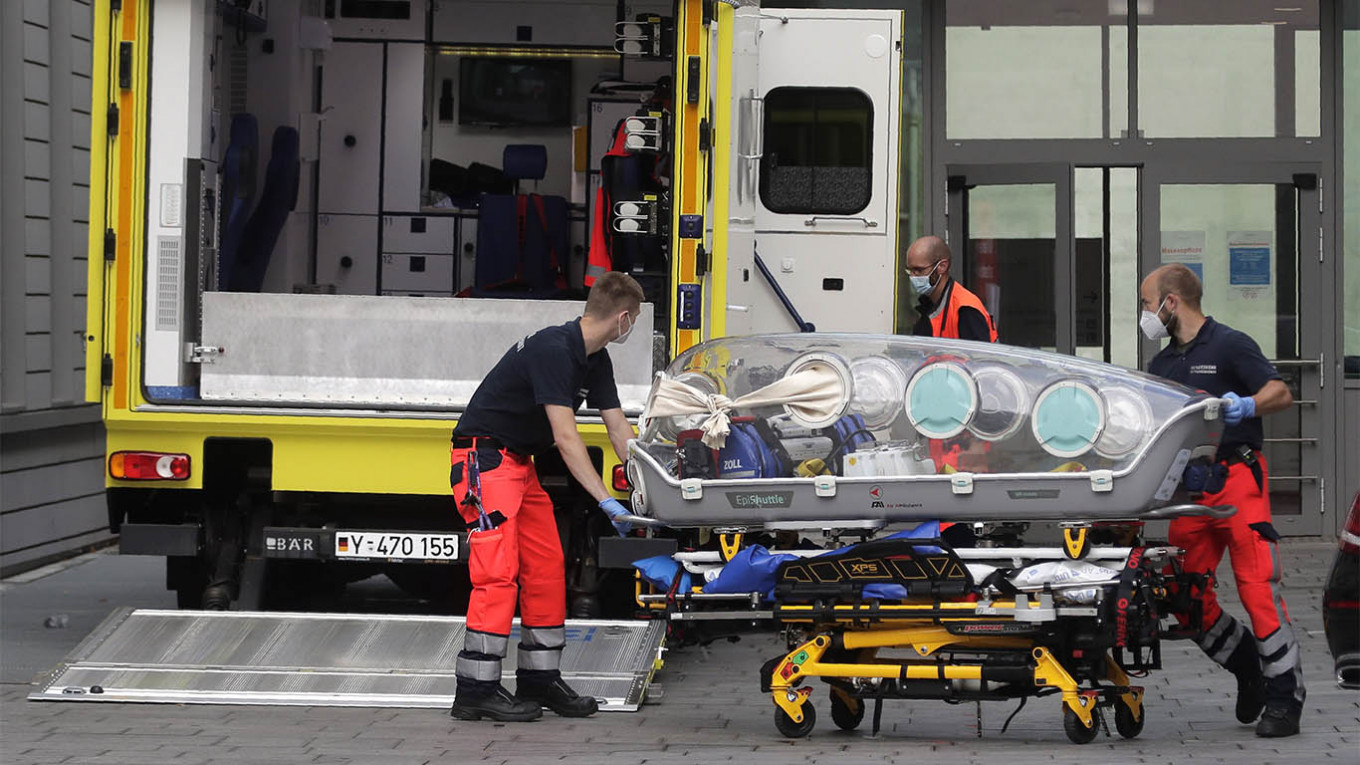After several days of speculation, doctors at Berlin’s Charité hospital, where Russian opposition figure Alexei Navalny was flown from the Siberian city of Omsk after collapsing on board a flight last week, finally confirmed on August 24 that he does indeed appear to have been poisoned.
While doctors attempt to identify the substance used, the Kremlin is acting as though nothing is happening, while Navalny’s entourage is convinced that he has fallen victim to a plot by the Russian state. It may take months or even years to establish exactly what happened, but the attack on Navalny is in itself a grave symptom that points to the erosion of the security resources of President Vladimir Putin’s Russia.
Navalny remains the most prominent non-systemic opposition figure in Russia, and as such has been thwarted by the regime in his attempts to run for president, register a political party, and obtain permission to hold rallies. Despite this, he still clocks up some notable achievements. His most recent was orchestrating tactical voting in last year’s elections for the Moscow city parliament, which led to several unexpected defeats for candidates backed by the regime.
Navalny’s status outside the system also means that he cannot count on getting justice from the state, which views him as something approaching a cancer cell, and is slowly poisoning him by making life unbearable for him, as well as for his loved ones and associates. For this reason, a thorough investigation into his poisoning is not to be expected: the regime won’t search hard for answers, even if the crime was carried out by a fringe group.
The leaders of the real opposition (as opposed to the long-standing in-system “opposition” parties represented in parliament) are particularly vulnerable to attack right now. Structures close to the state treat such enemies as political lepers. That status has started to become an invitation to attack them, and an implicit vindication of anyone who does so.
For Putin, Navalny’s political activity is right on the periphery of the boundless geopolitical universe. His role in the poisoning is to have deliberately made the opposition vulnerable: in stripping the opposition of its right to act according to the rules, the Kremlin has also tacitly legalized poor treatment of the opposition.
The version of events circulating that Putin personally ordered “a solution to the Navalny problem” looks doubtful. Sure, the Kremlin may consider Navalny an adventurist rather than a politician, but he doesn’t fall into the category of traitor, unlike fellow poisoning victims Alexander Litvinenko and Sergei Skripal.
For the Kremlin, Navalny’s activity carries two potential risks: that he becomes a hero if the authorities’ treatment of him looks obviously unjust, or that Navalny is chosen as a sacrificial victim to destabilize the situation. In other respects, the Kremlin does not consider Navalny a danger because Putin is convinced of his own unconditional popularity, and believes in the stability of the system he has created. Under this logic, an attempt to kill the opposition figure would be an undeserved promotion in political status that could turn him into a hero.
Another version — that Navalny has been neutralized ahead of upcoming regional elections — is problematic for similar reasons. First, the people in charge of the elections are not involved in poisonings: they have other methods of waging political warfare. And second, Navalny’s removal from the scene is unlikely to solve the authorities’ electoral headaches. Even if it weakens and beheads the non-systemic opposition, that will only be a temporary effect, and, if anything, it will only create extra tension and galvanize those who once hesitated.
Despite being formally excluded from the political system, Navalny has long been an important part of Russian politics. His painstaking investigations into corruption among high-profile figures impact the internal configuration of power; he dictates the agenda at times; and, in many ways, his teams and exhortations determine the course of the modern Russian protest movement.
Amateur sleuths have already divided Navalny’s possible poisoners into two groups. The first consists of the subjects of his investigations: people who were either seeking revenge or wanted to put a stop to his revelations. The second is people who might volunteer to assist the regime. Navalny isn’t the first Kremlin critic to have been poisoned in recent years, and in 2015, the opposition politician Boris Nemtsov was shot dead in the shadow of the Kremlin walls. Those crimes look like an attempt to satisfy the regime’s demand for “protection services.”
The formation of a “protection services” market is a dangerous trend. It means that structures close to the authorities believe that the regime is no longer capable of dealing with threats itself. The murder of Nemtsov was organized by people who felt that the FSB was not doing its job. Navalny may have been poisoned by people who deemed it necessary to intervene when the power vertical failed to take action amid growing uncertainty.
Much has been said about the gradual erosion of the Russian state’s monopoly on the use of force. But if a previous attack on Navalny, in which antiseptic dye was thrown in his face, was carried out by extremists from the nationalist fringe group SERB, the current poisoning appears to be a far more complex and resource-intensive operation. What’s more, it was carried out right under the nose of the Federal Security Service (FSB), which has eyes on Navalny and those close to him at all times.
Players on the informal market of pro-regime “protection services” are increasingly plying their trade on the turf of the state security services. Plus, the use of poisoning as a means of punishment shows clearly that the person who ordered the attack isn’t just close to power, but has access to tools that are primarily the preserve of the security services. The regime’s immune system is beginning to falter, and requires artificial intervention for it to maintain a stable state.
Management of domestic politics in Russia is becoming increasingly competitive, with different clans fighting for the chance to stabilize and protect the regime. Amid this picture, the opposition is the easiest target. Taking part in politics outside of the artificial system managed by the Kremlin is becoming a health hazard, leaving Putin’s opponents few options other than emigration.
This article was first published by the Carnegie Moscow Center.
A Message from The Moscow Times:
Dear readers,
We are facing unprecedented challenges. Russia's Prosecutor General's Office has designated The Moscow Times as an "undesirable" organization, criminalizing our work and putting our staff at risk of prosecution. This follows our earlier unjust labeling as a "foreign agent."
These actions are direct attempts to silence independent journalism in Russia. The authorities claim our work "discredits the decisions of the Russian leadership." We see things differently: we strive to provide accurate, unbiased reporting on Russia.
We, the journalists of The Moscow Times, refuse to be silenced. But to continue our work, we need your help.
Your support, no matter how small, makes a world of difference. If you can, please support us monthly starting from just $2. It's quick to set up, and every contribution makes a significant impact.
By supporting The Moscow Times, you're defending open, independent journalism in the face of repression. Thank you for standing with us.
Remind me later.








